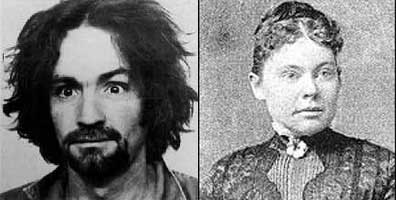Charles Manson and Lizzie Borden

In the vol. 174, 2002 of Military Law Review, posted on jagcnet.army.mil website, is a curious reference to Lizzie Borden. Or should I say “Lizzy” Borden.
In what appears to be the text of a speech presented on November 21, 2002, on “Constitutional Dignity and the Criminal Law,” Judge James E. Baker, from the United States Court of Appeals for the Armed Forces, is addressing the 26th Criminal Law New Developments Course. About half way through his speech he makes the following statements:
Americans are fascinated by the criminal law. During prime time there are two crime shows on network television every night. Television reflects our tastes, and some suggest, contributes to those tastes by fostering the very violence depicted.
For sure, as Stanford University law professor Lawrence Friedman has pointed out, there is an element of prurient interest to this fascination. The criminal law allows us a look at the lives of the rich and famous, and perhaps, in the fall from fame or wealth of a Claus von Bulow or an O.J. Simpson, we may gain confidence that happiness is not found in wealth or fame alone, if at all. Lizzy Borden and Charles Manson remain a revolting part of America’s culture, and not because of the legal importance of their trials.
I find it interesting that Lizzie is placed in the same context as Charles Manson, which of course insinuates that she was tried and convicted of her crimes, which we know she was not. Perhaps the Judge is not referring to this aspect as their commonality, but rather the gruesome nature of the crimes they were accused of committing. However, since Lizzie was judged as “not guilty” of the crimes, I find it upsetting to see a learned individual such as this use Lizzie in this fashion. He could have easily have used a different person, a Jeffrey Dahmer or a John Wayne Gacy, or even Richard Speck—someone who killed and killed again and were found guilty of their crimes.
Here is the complete speech, all 18 pages, in one PDF for downloading. Enjoy!




